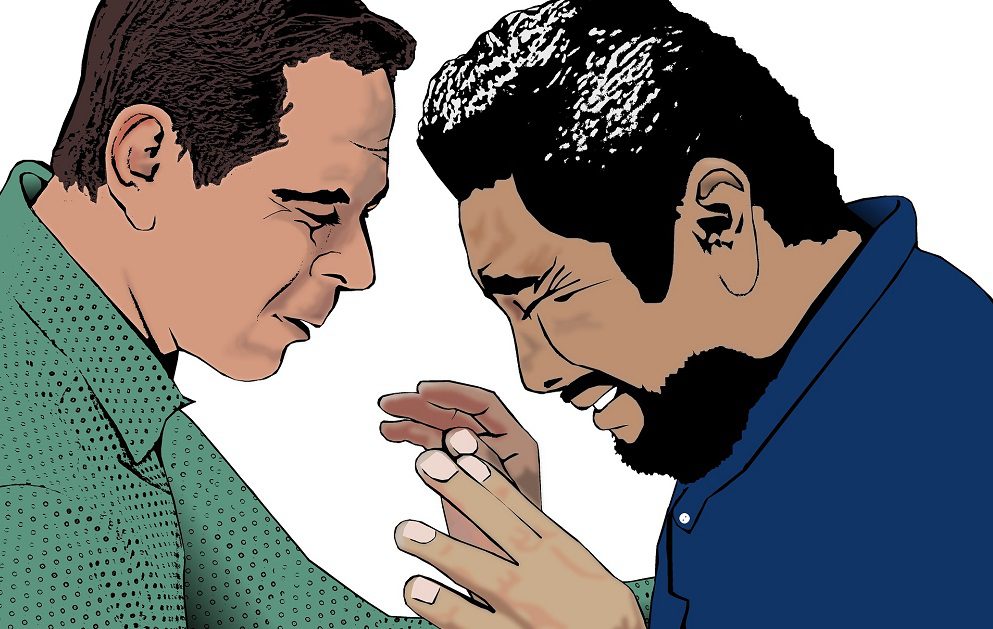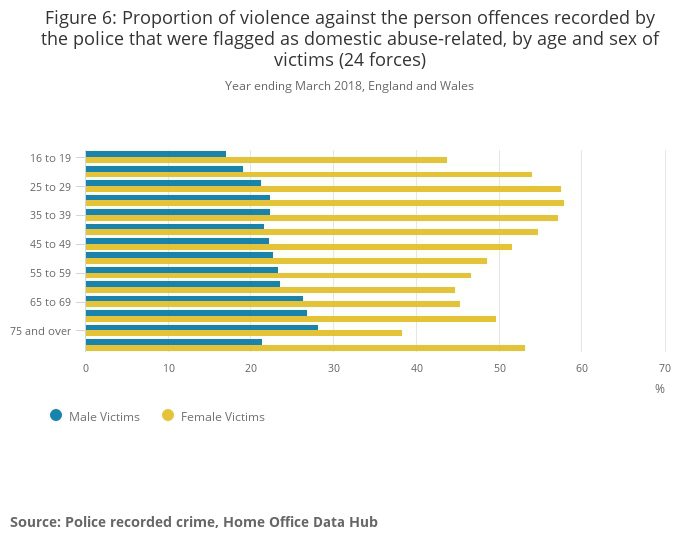Male victims of domestic abuse: a hidden problem that gets worse as we get older
Despite thousands of domestic violence victims being male, not only are they far less likely to report the crime, but as we grow older, more women become abusers.
A report created from data supplied by 24 difference police forces around the UK in 2018 shows that from our late 40s to around age 75, the volume of female victims drops, and male victims of domestic abuse numbers rise.
This is attributed in part to the decline of violent physical abuse, and the figures include other types of abuse such as psychological, emotional etc – put bluntly, in our younger years men are handier with their fists and as we age and become less fit, more women become abusers, but in a non-physical way.
It’s a growing issue that is revealed by some startling Home Office figures, and yet, as of last year, according to charity ManKind, only 0.8% of refuge beds were for men. The support networks and safe houses that exist for female victims obviously exist for good reason, but considering the volume of male victims, their needs are woefully under met. And it’s largely because men aren’t good at asking for help.
But support for men is scant. So what recourse is open to male victims – assuming they even have the confidence to do something about it? If you leave, you risk losing everything you’ve worked to build up, and if you stay, you commit yourself to accepting the ongoing abuse. Days off work for black eyes and scratches, lame excuses for bruising, avoiding your friends and family and plummeting self-esteem – this is not women talking here, but men, and it’s definitely no laughing matter.
Case study: Mark
Mark* is 54 and he’s sleeping on his mate’s sofa. He’s been there for a few weeks now whilst waiting to move into a shared flat with another friend – he can’t afford to just rent a place for himself. Mark doesn’t really want to be doing this; he’s a grown man with an executive job, a daughter at uni, and until recently a home and a wife. But Mark is sleeping on his mate’s sofa because he’s left his wife Jane*, and has nowhere else to go.
Mark is a victim of domestic abuse, and after years of living with increasing levels of domestic violence, has finally been forced to leave his wife, because if he hadn’t, she might very well have ended up killing him.
Mark and Jane met in the late nineties, and after spending the best part of a blissful, whirlwind year together, got married in a lavish ceremony in the Caribbean. Although Mark was sure enough about the relationship to marry her, it was clear there were problems right from the start.
“I noticed that she had a massive temper, and that she could be violent, because of the things she said, and things she’d done. You could sit in a room and know immediately that she’d been upset by something that someone else had said. There’d be arguments, sometimes about us, more often about other people, but in the early stages she wouldn’t feel that she could attack me, because I’m quite easy-going.
She was small, but for a small girl she could really pack a punch. So it’d be smack, one black eye; smack, another one to match
“It was generally to do with her friends or people around her, who she frequently fell out with. So I would try to be a calming influence, or more of a voice of reason. I’d say, maybe that this isn’t quite the way it is. And she would say, you don’t understand, you’re just weak.”
Mark hoped his approach might diffuse Jane’s anger, but over the years things gradually began to deteriorate. Their arguments worsened and her aggression and violence became more apparent. And Mark found as time went by that his self-confidence was shattered too.
“She smashed the kitchen to pieces once. I saw her – she broke her foot, kicking fuck out of the kitchen door, and her child was up crying, asking me what was going on. She just smashed our home to pieces.
“She could drive an argument out of nothing. So we’d have a situation, say, where she’d pick on something, or ask me a question. Then if she didn’t like the answer we’d go round and round, and deeper and deeper and deeper, until we’d get to a point where she’d yell at me, get out of the house, I just don’t want you here. And I’d be like, but I live here. And that, pretty much, was the point where it would get really, really violent.
“She was small, but for a small girl she could really pack a punch. So it’d be smack, one black eye, smack, another one to match, and I’d be crying, for fuck’s sake stop. Please. Look at the state of me.”
Men struggle to admit to the problem
Reported cases of domestic violence against men are on the increase, and estimates show these reports are just the tip of the iceberg. Men are backwards in coming forwards when faced with this situation – being beaten or abused is seen as embarrassing perhaps, or weak – regardless of whether they’re in hetero or LGBT relationships. So very often a male victim will only surface when he ends up in hospital, or even the morgue.

(Model)
It’s clear, therefore, that there are many more cases of ongoing domestic abuse that stay firmly behind closed doors. But it seems that gradually, men are learning to ask for help. The problem now is that there isn’t much that anyone can do for them. Detective Sergeant Phil Aldred at the Sussex Police Anti-Victimisation Unit is frustrated by the lack of practical support available to the men that pass through his hands.
“Men walk into the station and ask for help, and our hands are tied. We can give them advice, and the ‘there, there, there’ factor, but there isn’t actually anything tangible that they can leave the station with.”
Cristel Osmann was based at the same unit and responsible for spearheading a campaign some years ago, not just to raise awareness of this problem, but to activate agencies and groups to tackle it.
Often the most important thing is that someone’s actually listening to them for the first time
“First and foremost is the issue of getting men to admit that they are being abused, and secondly, to get them to ask for help,” she explains.
“There aren’t the same services for men as there are for women; it’s very difficult to access any services at all for male victims. Often the most important thing is that someone’s actually listening to them for the first time. And then trying to help them in a more practical way. It’s the same the country over when it comes to dealing with men who are being abused. The ‘too difficult’ light comes on, and so they do nothing.”
So this is why Mark is sleeping on his mate’s sofa. The bottom line is this. If a woman is being abused, there’s a range of agencies and organisations geared towards helping her flee the situation. For men, there’s very little. Also, the legal standing and very often the overall situation for an abused man is completely different to that of an abused woman, particularly if there are children involved.
He’s unlikely to throw her out, and she’s unlikely to leave, so he’s usually faced with staying and accepting the situation, or leaving and starting from scratch alone. And as the majority of parental rights hang with mothers, he doesn’t easily have the option of leaving and taking his children with him.
The danger is real – but also emotional
Don’t make the mistake of imagining that the abuse might not be serious. The police have been faced with some appalling damage inflicted on male partners, ranging from stab wounds to serial sadistic abuse, such as cigarette burns on hands and nipples. One particular incidence that Mark remembers indicates the level of violence that women are capable of.
“The rows had become more frequent and the level of violence more extreme. And then one night, she just lost it. I’ve taken two punches in the face, where the wedding ring that I bought her has just cut my eye open. I’ve got one black eye, I’ve got another black eye now, and the next thing you know, a table lamp which is about a quarter of a inch thick has been cracked across the back of my head. I’ve got an open gash and I’m bleeding everywhere.”
To me, the hardest thing is when you have a desperate man who’s sitting sobbing his heart out to complete strangers
This is pretty fierce, and Det Sgt Aldred comes face to face with this kind of thing quite often. But the problem he feels is less about the actual violence itself, and more about the effect it has on the men.
“Every time someone has a pair of scissors stuck into them, or an ornamental knife or a kitchen knife, it’s centimetres away from death. But to me, the hardest thing is when you have a desperate man who’s sitting sobbing his heart out to complete strangers. To me, that’s much harder than someone who has a stab wound which will get better, and will go away.”

Cristel identifies the issue of control. “I think that the dynamics of the relationship are exactly the same – it’s all about power and control, whichever way round it is. They will try and keep control of their partner by belittling them or abusing them by whatever means. I used to do a drop-in surgery and on one of the first nights this chap came in. He was nearly 70, he’d been married for fifty-something years, and he’d been suffering years of abuse. He just kept saying ‘Thank you for believing me’.”
Mental abuse is just as much of a potent weapon, but by far the most common factor in incidences of domestic violence is the use of drugs and alcohol – with alcoholism being top of the list. The largest volume of domestic violence reports come in over the weekend nights, but it’s the creeping, ongoing torture that generally never makes the headlines, where alcohol plays the greatest part.
Becoming part of the problem
So how do you deal with this? What do you do if your wife or girlfriend is subjecting you to violent or mental abuse? In all domestic abuse cases, the police find themselves called out time and time again to the same address. The incidences, over time, usually escalating in their severity, and in the worst cases with someone ending up dead.
I started to feel that what was happening between us was becoming part of me, like violence, and lying and manipulation was normal
The fact is that although your partner may be abusing you on a regular basis, it’s often very difficult to just walk away. Relationships are complex arrangements, and the abuse might only be a small part of it. But how do you handle it when your wife or girlfriend is screaming abuse at you, punching you in the face or holding a knife to your throat?
In a situation like this, it’s hard to know what to do. Maybe you try to calm things down, maybe you walk away. In some cases, instinct might tell you to fight back. What is clear is that over a protracted length of time, a domestic abuse victim will find his or her personality altered. Living with someone you love who persists in treating you in such a destructive way will eventually take its toll.
You live with fear, you feel alone, you are embarrassed by your injuries, which leads to a loss of self-confidence, and often you will find yourself dragged into violent exchanges which are completely out of character. Mark, who had never been a violent man before, was drawn into fight after fight, and he found that eventually, he began to buy into the violence, began to retaliate.
“I started to feel that what was happening between us was becoming part of me, like violence, and lying and manipulation was normal. And it isn’t normal. So you get to a point in a relationship where words aren’t going to work, and you start to lose the power of speech, because you get so mad, and then there’s nowhere else for it to go. I would never lash out first. No, I did once. I’d been drinking a lot of vodka, and she wouldn’t speak to me. I went mad, kicked the door in, and…I can’t talk about it. I really hate myself for it, really not proud of myself.”
Men generally get the blame
Usually when situations like this escalate and the police become involved, it is the male who will be arrested. The officers who arrive on the scene are faced with the responsibility of assessing the situation, and they quite often get it wrong. When Mark’s wife smashed a lamp over his head, the police were called, and yet, despite the clear evidence at the scene, it was Mark that was arrested.
“She’s still yelling at me and she’s then called the police, screaming, he won’t leave, he won’t go. So I’m saying, what have I done wrong? We’ve had an argument, and you’ve done this to me, so who’s wrong? Well it turns out that I am. Because I’m off, I’m the one in the back of the squad car, and I’m saying well, did you see any marks on her?”
Det Sgt Aldred acknowledges that this is a problem the force needs to address. “We’ve probably got it wrong more than we’ve got it right. But it’s very difficult to talk about this hypothetically – you have to make a decision based on what you see. So it may well be that the police turn up, there’s been a violent exchange between these two people, and they will act on what they see. And if the argument’s going on and they remove the male from the premises, it may not be until a later stage that they actually find out what the root cause of it was.”
We’ve probably got it wrong more than we’ve got it right. But it’s very difficult to talk about this hypothetically – you have to make a decision based on what you see
The main thing, it seems, is simply to be able to offer men someone to talk to. Mark left his wife, and was lucky enough to have the support of family and friends to see him through the break-up. But for others, an improved support network could be vital.
Charity ManKind reports that whilst one in six men will experience some domestic violence at some time in their lives, roughly one in 20 will actually seek help. And part of that problem is the lack of support available, with some men having to travel up to 150 miles to find help. Even if it’s just having someone to talk to.
“I wanted to talk to someone, to people who’d been through the same thing” says Mark. “You know, if you go to hospital you see people with broken arms, with their arms in plaster, and you know they’re going to be better in six weeks. My heart’s broken, and there’s no plaster. And there’s just sorrow.”
FOOD FOR THOUGHT
- The police recorded 599,549 domestic abuse-related crimes in the year ending March 2018.
- This was an increase of 23% from the previous year.
- However, the latest available estimates from the Crime Survey for England and Wales (CSEW) showed that over four in five victims (83%) of partner abuse did not report the abuse to the police.
- Domestic abuse is not limited to physical violence. It can include repeated patterns of abusive behaviour to maintain power and control in a relationship, including psychological, physical, sexual, financial or emotional abuse.
- Women were around twice as likely to have experienced domestic abuse than men (7.9% compared with 4.2%). This equates to an estimated 1.3 million female victims and 695,000 male victims.

ManKind – Helping Men Escape Domestic Abuse
If you are affected by any of the issues in this article and would like to talk to someone, call the National Victim Support Helpline – 0845 30 30 900
The Home Office also funds the Men’s Advice Line, a confidential, free phone helpline for male victims of domestic abuse. The service offers practical advice, information and emotional support to male victims, as well as to concerned friends and family and frontline workers.
* Names have been changed

Sam is Silver’s founder and editor-in-chief. She’s largely responsible for organising all the things, but still finds time to do the odd bit of writing. Not enough though. Send help.



Leave a comment